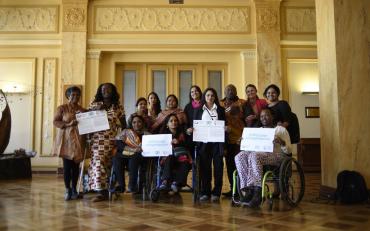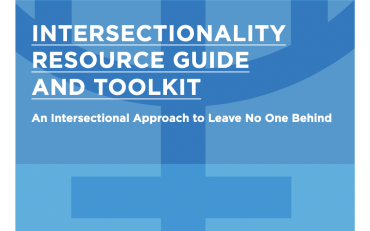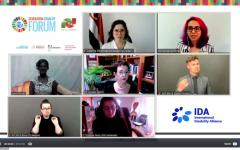IDA was invited to support UN Women to contribute to the design, development, and testing of the Intersectionality Resource and Guide Toolkit: An Intersectional Approach to Leave No One Behind following an intersectional approach and promoting the leadership of and accountability towards the diversity of persons with disabilities. The purpose was also to guarantee that the final toolkit would be fully informed by the realities and priorities of people who experience intersecting and multiple forms of discrimination, including persons with disabilities.

IDA supports the ‘We, Women and Girls with disabilities, Want…” campagn: #WeWwdWant - a call for women and girls with disabilities across the world to express what they want from the international community to advance their rights.
In 2015, IDA Chair, Maryanne Diamond, led this campaign to seek to ensure that women and girls with disabilities are closely consulted and actively involved at all levels of decision-making and within these global agendas. Maryanne is committed to working closely with the Committee on the Rights of Persons with Disabilities, chaired by Maria Soledad Cisternas, and the Special Rapporteur on the Rights of Persons with Disabilities, Catalina Devandas, to pass on the messages of women and girls with disabilities around the world to high-level representatives that can impact and support their rights in the international arena.
With this in mind, the #WeWwdWant campaign was launched to give visibility to women and girls with disabilities as human rights holders and activists. Since December last year, women with disabilities and allies across the world have shared that they want: reproductive rights; abolition of the medical model; abolition of forced sterilisation; equal access to education & decent work; capacity building for autonomy & independence for all; independent living, among others.
Women with disabilities today account for three quarters of all persons with disabilities in low and middle-income countries - a majority of which live in rural and remote areas of developing countries. They continue to be subjected to multiple and intersectional discrimination on account of their gender, disability and other elements of their identities such as their age, socio-economic class, indigenous or ethnic group, sexuality or religion, among others.
Let’s change this together!
Join us online on twitter and Facebook using our hashtag sheet http://bit.ly/1Hhm3q5 and let us know what you want, as a woman or girl with disabilities, or as an ally of women and girls with disabilities!
Contact: tfleury [at] ida-secretariat.org

